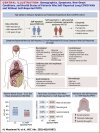Characterization of Postural Orthostatic Tachycardia Syndrome in Long COVID: Self-reported Data From the LISTEN Study
BACKGROUND
Postural orthostatic tachycardia syndrome (POTS) has emerged as a significant cardiovascular phenotype among individuals experiencing postacute COVID-19 syndrome, commonly referred to as long COVID.
OBJECTIVES
The purpose of this study was to describe the experience of people reporting long COVID-associated POTS.
METHODS
We collected data from individuals aged ≥18 years with self-reported long COVID who participated in the Yale Listen to Immune, Symptom and Treatment Experiences Now (LISTEN) cohort, an online observational study. The study included participants surveyed from May 2022 to July 2023. POTS status was determined by self-reported diagnosis of POTS. We compared the demographics, symptoms, associated conditions, and health status of people with and without self-reported POTS.
RESULTS
Of the 578 individuals included, 167 (28.9%) reported new-onset POTS and 411 (71.1%) did not report POTS as one of their long COVID-associated conditions. Seventy-eight percent of participants with self-reported POTS were women (range, 18-74 years). Participants with self-reported POTS were younger, had more financial difficulties, more social isolation, more suicidal thoughts, worse health status measured by the EuroQoL visual analog scale, and reported higher rates of rapid heart rate after standing up, dizziness, palpitations, persistent chest pain, sudden chest pain, excessive fatigue, exercise intolerance, heat intolerance, brain fog, tinnitus, migraine, internal tremors, skin discoloration, and dry eyes, as well as new-onset myalgic encephalomyelitis/chronic fatigue syndrome and mast cell disorders.
CONCLUSIONS
Individuals with self-reported long COVID-associated POTS experienced substantial health burdens in various domains compared with those without self-reported POTS, highlighting the urgency for further research to understand the mechanism, characterize the physiological derangements, and target treatments so we can help these individuals.
Web | PDF | JACC: Advances | Open Access
Mohammad Al Mouslmani, Md, Mph; Mitsuaki Sawano, Md, PhD; Adith S Arun, Bs; Yilun Wu, Bs; Rishi M Shah; Shayaan Kaleem; Tianna Zhou, Md; Karthik Murugiah, Mbbs; Yuan Lu, ScD; Jeph Herrin, PhD; Pamela Bishop, PhD; Pam Taub, Md; Aldo J Peixoto, Md; Bornali Bhattacharjee, Ms, PhD; Akiko Iwasaki, PhD; Harlan M Krumholz, Md, Sm
BACKGROUND
Postural orthostatic tachycardia syndrome (POTS) has emerged as a significant cardiovascular phenotype among individuals experiencing postacute COVID-19 syndrome, commonly referred to as long COVID.
OBJECTIVES
The purpose of this study was to describe the experience of people reporting long COVID-associated POTS.
METHODS
We collected data from individuals aged ≥18 years with self-reported long COVID who participated in the Yale Listen to Immune, Symptom and Treatment Experiences Now (LISTEN) cohort, an online observational study. The study included participants surveyed from May 2022 to July 2023. POTS status was determined by self-reported diagnosis of POTS. We compared the demographics, symptoms, associated conditions, and health status of people with and without self-reported POTS.
RESULTS
Of the 578 individuals included, 167 (28.9%) reported new-onset POTS and 411 (71.1%) did not report POTS as one of their long COVID-associated conditions. Seventy-eight percent of participants with self-reported POTS were women (range, 18-74 years). Participants with self-reported POTS were younger, had more financial difficulties, more social isolation, more suicidal thoughts, worse health status measured by the EuroQoL visual analog scale, and reported higher rates of rapid heart rate after standing up, dizziness, palpitations, persistent chest pain, sudden chest pain, excessive fatigue, exercise intolerance, heat intolerance, brain fog, tinnitus, migraine, internal tremors, skin discoloration, and dry eyes, as well as new-onset myalgic encephalomyelitis/chronic fatigue syndrome and mast cell disorders.
CONCLUSIONS
Individuals with self-reported long COVID-associated POTS experienced substantial health burdens in various domains compared with those without self-reported POTS, highlighting the urgency for further research to understand the mechanism, characterize the physiological derangements, and target treatments so we can help these individuals.
Web | PDF | JACC: Advances | Open Access

